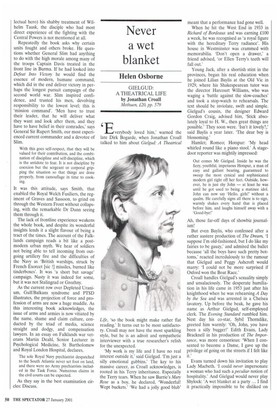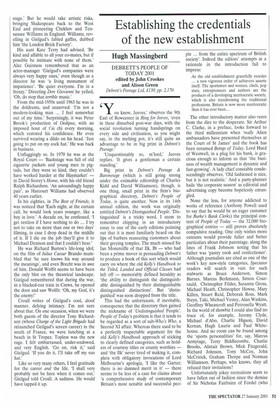Never a wet blanket
Helen Osborne
GIELGUD: A THEATRICAL LIFE by Jonathan Croall Methuen, £20, pp. 579 ‘E verybody loved him,' warned the late Dirk Bogarde, when Jonathan Croall talked to him about Gielgud: A Theatrical Life, `so the book might make rather flat reading.' It turns out to be most satisfactory. Croall may not have the most sparkling style, but he is an adroit and sympathetic interviewer with a true researcher's relish for the unexpected.
'My work is my life and I have no real interest outside it,' said Gielgud. 'I'm just a silly emotional gubbins.' The key to his massive career, as Croall acknowledges, is rooted in his Terry inheritance. Especially the Terry tears. When he saw Barrie's Mary Rose as a boy, he declared, 'Wonderful! Wept buckets.' We had a jolly good blub'
meant that a performance had gone well.
When he hit the West End in 1933 in Richard of Bordeaux and was earning £100 a week, he was recognised as 'a royal figure with the hereditary Terry radiance'. His house in Westminster was crammed with memorabilia. 'Don't open a drawer,' a friend advised, 'or Ellen Terry's teeth will fall out.'
Young Jack, after a shortish stint in the provinces, began his real education when he joined Lilian Baylis at the Old Vic in 1929, where his Shakespearean tutor was the director Harcourt Williams, who was waging a 'battle against the slow-coaches' and took a stop-watch to rehearsals. The text should be inviolate, swift and simple. Gielgud's cousin, the designer Edward Gordon Craig, advised him, 'Stick absolutely loyal to H. W., then great things are possible.' They soon were. 'Isn't it lovely?,' said Baylis a year later. 'The dear boy is blossoming.'
Hamlet; Romeo; Hotspur: 'My head whirled round like a piano stool.' A stagedoor reporter was mightily impressed: Out comes Mr Gielgud. Inside he was the fiery, youthful, impetuous Hotspur, a man of easy and gallant bearing, guaranteed to sweep the most cynical and sophisticated modern girl right off her feet. Outside, however, he is just shy John — at least he was until he got used to being a matinee idol. John can now say 'Hello, girls!' without a qualm. He carefully signs all there is to sign, warmly shakes every hand that is placed before him, and laughs himself away with a 'Good-bye!'
Ah, those far-off days of showbiz journalism!
But even Baylis, who confessed after a rather austere production of The Dream, 'I suppose I'm old-fashioned, but I do like my fairies to be gauzy,' and admired the ballet because 'all the boys have such pretty bottoms,' reacted incredulously to the rumour that Gielgud and Peggy Ashcroft would marry: 'I could not be more surprised if Oxford won the Boat Race.'
Croall handles Gielgud's sexuality simply and unsalaciously. The desperate humiliation in his life came in 1953 just after his knighthood when he was rehearsing A Day by the Sea and was arrested in a Chelsea lavatory. Up before the beak, he gave his name as Arthur Gielgud, self-employed clerk. The Evening Standard rumbled him Next day his co-star, Sybil Thomdike, greeted him warmly: 'Oh, John, you have been a silly bugger!' Edith Evans, Lady Bracknell in his production of The Importance, was more censorious: 'When I consented to become a Dame, I gave up the privilege of going on the streets if I felt like it.'
Evans turned down his invitation to play Lady Macbeth. 'I could never impersonate a woman who had such a peculiar notion of hospitality.' And Gielgud would never play Shylock: 'A wet blanket at a party ... I find it practically impossible to be disliked on
stage.' But he would take artistic risks, bringing Shakespeare back to the West End and pioneering Chekhov and Tennessee Williams in England. Williams, revelling in Gielgud's fabled gaffes, dubbed him 'the London Brick Factory'.
His aunt Kate Terry had advised, 'Be kind and affable to all your co-mates, but if possible be intimate with none of them.' Alec Guinness remembered that as an actor-manager `Gielgud's companies were always very happy ones,' even though as a director he was 'a living monument of impatience'. 'Be quiet everyone. I'm in a frenzy.' Directing Don Giovanni he yelled, 'Oh, do stop that terrible music.'
From the mid-1950s until 1963 he was in the doldrums, and unnerved: 'I'm not a modern-looking man ... I feel somewhat out of my time.' Surprisingly, it was Peter Brook's production of Oedipus, with an imposed hour of t'ai chi every morning, which restored his confidence. He even survived wearing a dildo on his head. 'Just going to put on my cock hat.' He was back in business.
Unflaggingly so. In 1970 he was at the Royal Court — 'Backstage was full of old cigarette packets and young men in pigtails, but they were so kind, they couldn't have worked harder at the Haymarket' — in David Storey's Home, with his old friend Ralph Richardson. 'An astoundingly happy pair', as Harcourt Williams had observed 40 years earlier.
In his eighties, in The Best of Friends, it was noticed that 'Each night, at the curtain call, he would look years younger, like a boy in love.' A decade on, he confessed, 'I get restless if I have nothing to do ... I try not to take on more than one or two days' filming, in case I drop dead in the middle of it. If I die on the job they'll give it to Michael Denison and that I couldn't bear.'
He was Richard Burton's life-long idol; on the film of Julius Caesar Brando mumbled that 'he sure knows his way around the meanings', and even Brecht was in awe of him. Donald Wolfit seems to have been the only blot on the theatrical landscape. Gielgud remembered that during the war, in a blacked-out train in Crewe, he opened the door and saw Wolfit: 'Oh, my God, it's the enemy!'
Croall writes of Gielgud's cool, aloof manner, defying intimacy. I'm not sure about that. On one occasion, when we were both guests of the director Tony Richardson (whose Charge of the Light Brigade had relaunched Geilgud's screen career) in the south of France, we were lunching at a beach in St Tropez. Topless was the new rage. I felt embarrassed, under-endowed, and very English. `Go on, risk it,' said Gielgud. 'If you do it, I'll take off my sun hat.'
Like so very many others, I feel gratitude for the career and the life. 'I shall very probably not be here when it comes out,' Gielgud told Croall. A sadness. He would have lapped it up.























































































 Previous page
Previous page